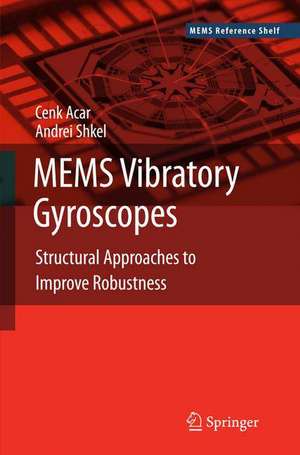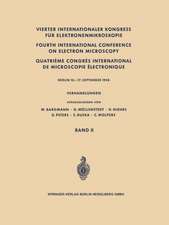MEMS Vibratory Gyroscopes: Structural Approaches to Improve Robustness: MEMS Reference Shelf
Autor Cenk Acar, Andrei Shkelen Limba Engleză Hardback – 23 oct 2008
| Toate formatele și edițiile | Preț | Express |
|---|---|---|
| Paperback (1) | 1106.63 lei 6-8 săpt. | |
| Springer Us – 9 noi 2010 | 1106.63 lei 6-8 săpt. | |
| Hardback (1) | 1111.34 lei 6-8 săpt. | |
| Springer Us – 23 oct 2008 | 1111.34 lei 6-8 săpt. |
Preț: 1111.34 lei
Preț vechi: 1355.30 lei
-18% Nou
Puncte Express: 1667
Preț estimativ în valută:
212.66€ • 227.40$ • 177.31£
212.66€ • 227.40$ • 177.31£
Carte tipărită la comandă
Livrare economică 18 aprilie-02 mai
Preluare comenzi: 021 569.72.76
Specificații
ISBN-13: 9780387095356
ISBN-10: 0387095357
Pagini: 256
Ilustrații: XII, 260 p. 131 illus.
Dimensiuni: 155 x 235 x 18 mm
Greutate: 0.52 kg
Ediția:2009
Editura: Springer Us
Colecția Springer
Seria MEMS Reference Shelf
Locul publicării:New York, NY, United States
ISBN-10: 0387095357
Pagini: 256
Ilustrații: XII, 260 p. 131 illus.
Dimensiuni: 155 x 235 x 18 mm
Greutate: 0.52 kg
Ediția:2009
Editura: Springer Us
Colecția Springer
Seria MEMS Reference Shelf
Locul publicării:New York, NY, United States
Public țintă
Professional/practitionerCuprins
Fundamentals of Micromachined Vibratory Gyroscopes.- Fundamentals of Micromachined Gyroscopes.- Fabrication Technologies.- Mechanical Design of MEMS Gyroscopes.- Electrical Design of MEMS Gyroscopes.- Structural Approaches to Improve Robustness.- Linear Multi DOF Architecture.- Torsional Multi DOF Architecture.- Distributed Mass Architecture.- Conclusions and Future Trends.
Recenzii
From the reviews:
“This book reviews the principles of linear and torsional dynamics of vibratory gyroscopes. … The book provides a comprehensive review of the state-of-the-art of MCGs that would undoubtedly be useful for specialist engineers.” (Benu Chatterjee, Materials World, March, 2011)
“This book reviews the principles of linear and torsional dynamics of vibratory gyroscopes. … The book provides a comprehensive review of the state-of-the-art of MCGs that would undoubtedly be useful for specialist engineers.” (Benu Chatterjee, Materials World, March, 2011)
Textul de pe ultima copertă
MEMS Vibratory Gyroscopes provides a solid foundation in the theory and fundamental operational principles of micromachined vibratory rate gyroscopes, and introduces structural designs that provide inherent robustness against structural and environmental variations.
In part one, the dynamics of the vibratory gyroscope sensing element is developed, common micro-fabrication processes and methods commonly used in inertial sensor production are summarized, design of mechanical structures for both linear and torsional gyroscopes are presented, and electrical actuation and detection methods are discussed along with details on experimental characterization of MEMS gyroscopes. In part two, design concepts that improve robustness of the micromachined sensing element are introduced, supported by constructive computational examples and experimental results illustrating the material.
MEMS Vibratory Gyroscopes is a must have book for engineers in both industry and academia who specialize in the design and manufacture of gyroscopes. Readers will find:
- A unique balance between theory and practical design issues.
- Comprehensive and detailed information outlining the mathematical models of the mechanical structure and system-level sensor design.
- Solid background Information on mechanical and electrical design, fabrication, packaging, testing and characterization.
About The MEMs Reference Shelf:
"The MEMs Reference Shelf is a series devoted to Micro-Electro-Mechanical Systems (MEMs) which combine mechanical, electrical, optical, or fluidic elements on a common microfabricated substrate to create sensors, actuators, and microsystems. The series, authored by leading MEMs practitioners, strives to provide a framework where basic principles, known methodologies and new applications are integrated in a coherentand consistent manner."
STEPHEN D. SENTURIA
Massachusetts Institute of Technology, Professor of Electrical Engineering, Emeritus
Caracteristici
Provides a unique balance between theory and practical design issues Presents comprehensive and detailed information outlining the mathematical models of the mechanical structure and system-level sensor design Provides a solid background on mechanical and electrical design, fabrication, packaging, testing and characterization



















